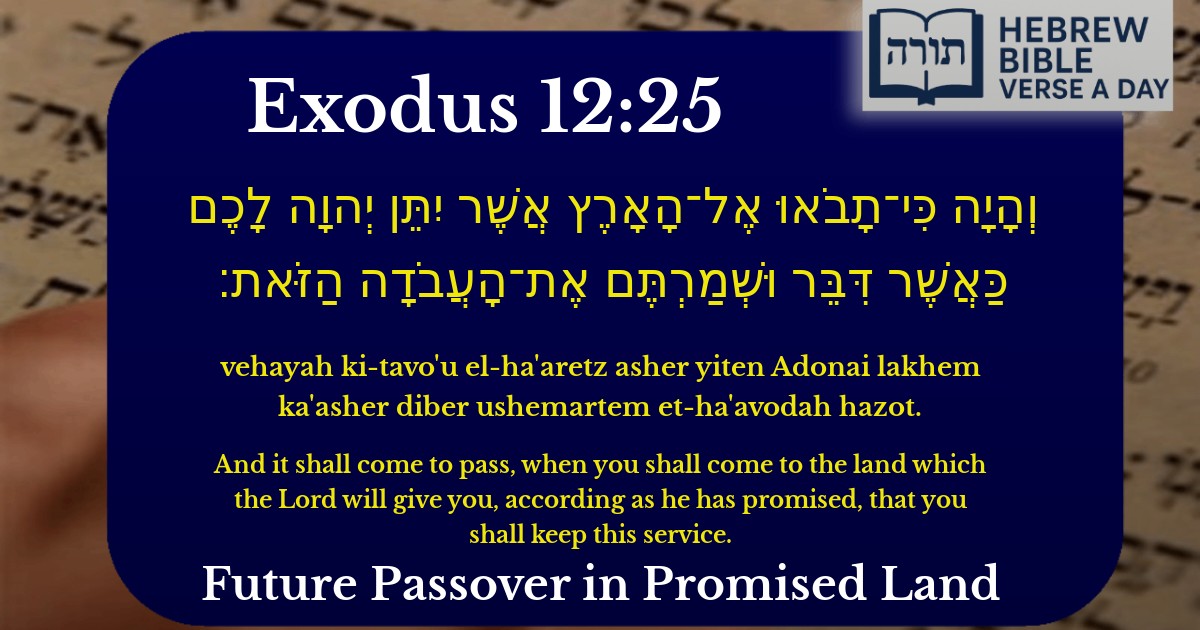Join Our Newsletter To Be Informed When New Videos Are Posted
Join the thousands of fellow Studends who rely on our videos to learn how to read the bible in Hebrew for free!
Hebrew Text
וְהָיָה כִּי־תָבֹאוּ אֶל־הָאָרֶץ אֲשֶׁר יִתֵּן יְהוָה לָכֶם כַּאֲשֶׁר דִּבֵּר וּשְׁמַרְתֶּם אֶת־הָעֲבֹדָה הַזֹּאת׃
English Translation
And it shall come to pass, when you shall come to the land which the Lord will give you, according as he has promised, that you shall keep this service.
Transliteration
Vehayah ki-tavo'u el-ha'aretz asher yiten Adonai lakhem ka'asher diber ushemartem et-ha'avodah hazot.
Hebrew Leining Text
וְהָיָ֞ה כִּֽי־תָבֹ֣אוּ אֶל־הָאָ֗רֶץ אֲשֶׁ֨ר יִתֵּ֧ן יְהֹוָ֛ה לָכֶ֖ם כַּאֲשֶׁ֣ר דִּבֵּ֑ר וּשְׁמַרְתֶּ֖ם אֶת־הָעֲבֹדָ֥ה הַזֹּֽאת׃
וְהָיָ֞ה כִּֽי־תָבֹ֣אוּ אֶל־הָאָ֗רֶץ אֲשֶׁ֨ר יִתֵּ֧ן יְהֹוָ֛ה לָכֶ֖ם כַּאֲשֶׁ֣ר דִּבֵּ֑ר וּשְׁמַרְתֶּ֖ם אֶת־הָעֲבֹדָ֥ה הַזֹּֽאת׃
🎵 Listen to leining
Parasha Commentary
📚 Talmud Citations
This verse is not quoted in the Talmud.


Context and Source
The verse appears in Shemot (Exodus) 12:25, part of the narrative surrounding the mitzvah of Pesach (Passover) and the Exodus from Egypt. It is spoken by Moshe to Bnei Yisrael before their departure, instructing them about the future observance of the Pesach sacrifice once they enter Eretz Yisrael.
Rashi's Commentary
Rashi explains that the phrase "וְהָיָה כִּי־תָבֹאוּ אֶל־הָאָרֶץ" ("And it shall come to pass, when you shall come to the land") refers to the obligation to observe the Korban Pesach (Paschal sacrifice) after entering the Land of Israel. He emphasizes that this mitzvah was not fully binding in the wilderness but would take effect once they settled in Eretz Yisrael (Rashi on Shemot 12:25).
Rambam's Perspective
Rambam (Maimonides), in Hilchot Korban Pesach, elaborates that the mitzvah of the Pesach sacrifice applies only when the majority of the Jewish people dwell in their land. This aligns with the verse's implication that the observance is tied to the inheritance of Eretz Yisrael (Mishneh Torah, Hilchot Korban Pesach 1:2-3).
Midrashic Interpretation
The Mechilta (a halachic Midrash on Shemot) connects this verse to the broader theme of divine promise and fulfillment. It teaches that Bnei Yisrael were assured that just as Hashem fulfilled His promise to bring them out of Egypt, He would also bring them into Eretz Yisrael, where they would observe the Pesach service (Mechilta de-Rabbi Yishmael, Bo 12).
Key Themes
Halachic Implications
The Talmud (Pesachim 96a) discusses whether the mitzvah of Pesach applied in the wilderness. The conclusion aligns with Rashi's view—that it was only fully obligatory upon entering Eretz Yisrael, though it was observed voluntarily in the wilderness (e.g., in the second year after the Exodus, as described in Bamidbar 9).